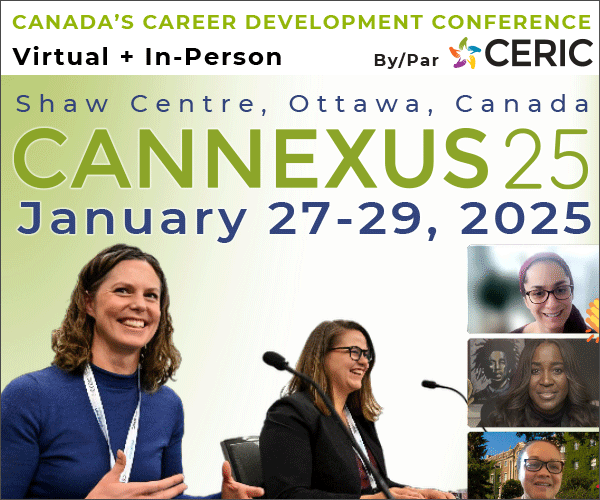Professionals in Post-Secondary Education: Conceptions of Career Influence
Keywords:
Post-secondary, education, career influence, professionalsAbstract
Students and their families seem to be consistently motivated to attain Canadian university or college credentials as they perceive post-secondary education as a viable avenue to gainful employment. Consequently, many post-secondary institutions are reacting and enhancing their career and employment services (Shea, 2010). However, as institutions continue to tackle the reality of dwindling resources, it may be unrealistic for campus career centres to assume the full responsibility of providing career guidance and programming for the entire student population.
References
Astin, A. W. (1993). What matters in college? Four critical years revisited. San Francisco, CA: Jossey-Bass.
Beer, L. E., Rodriguez, K., Taylor, C., Martinez-Jones, N., Griffin, J., Smith, T. R., Lamar, M., & Anaya, R. (2015). Awareness, integration and interconnectedness: Contemplative practices of higher education professionals. Journal of Transformative Education, 13(2), 161-185.
Bright, J., & Pryor, R. (2011). The chaos theory of careers: A new perspective on working in the twenty-first century. New York, NY: Routledge.
Canadian Association of College and University Student Services. (2011). Leaders in learning: Student affairs in Canada in the 21th century & implications for the Canadian Association of College and University Student Services. Retrieved from http://www.cacuss.ca/_Library/documents/CACUSS Identity_EN.pdf
Charmaz, K. (2006). Constructing grounded theory: A practical guide through qualitative analysis. Thousand Oaks, CA: SAGE Publications, Inc.
Cooper, J. E., & Stevens, D. D. (2006). Journal-keeping and academic work: Four cases of higher education professionals. Reflective Practice: International and Multidisciplinary Perspectives, 7(3), 349-366.
Cutler, H. A. (2003). Identity development in student affairs professionals. College Student Affairs Journal, 22(2), 167.
Downing, S. (2011). On course: Strategies for creating success in college and in life (6th ed.). Boston, MA: Wadsworth, Cengage Learning.
Environics Research Group. (2011). On-line survey on public perceptions about career development and the workplace. Toronto, ON: Canadian Education and Research Institute for Counselling. Retrieved from http://ceric.ca/wp-content/uploads/2012/10/Public-Perceptions-aboutCareer-Development-andthe-Workplace-FINAL-REPORT-Jan-31-2010.pdf
Fee, E. J., & Forsyth, G. (2010). Engaging the student learner. Presentation at the Strategic Enrolment Management Summit, Halifax, Nova Scotia. Retrieved from: http://uwindsor.ca/sem/sites/uwindsor.ca.sem/files/ SEM%20Summit%20Halifax%20April%2021VersionEJF.pdf
Glaser, B. G., & Strauss, A. L. (1967). The discovery of grounded theory: Strategies for qualitative research. Piscataway, NJ: Aldine Transaction.
Haley, K., Jaeger, A., Hawes, C., & Johnson, J. (2015). Going beyond conference registration: Creating intentional professional development for student affairs educators.
Journal of Student Affairs Research and Practice, 52(3), 313-326.
Harrison, L. M. (2014). How student affairs professionals learn to advocate: A phenomenological study. Journal of College and Character, 3, 165-178.
Hiebert, B., & Borgen, W. (2002). Technical and vocational education and training in the 21st century: New roles and challenges for guidance and counselling. Paris:
UNESCO Section for Vocational and Educational Training. Retrieved from http://unesdoc.unesco.org/images/0013/001310/131005e.pdf
Kuh, G.D., Kinzie, J., Schuh, J. H., Whitt, E. J., & Associates. (2010). Student success in college: Creating conditions that matter. San Francisco, CA: Jossey-Bass.
Parsons, F. (1909). Choosing a vocation. Boston, MA: Houghton Mifflin Company.
Pascarella, E. T., & Terenzini, P. T. (2005). How college affects students (Vol. 2). San Francisco, CA: Jossey-Bass.
Redekopp, D. E., & Austen, P. (2015). Community helpers: Program coordinator’s guide. Alberta, BC: LifeRole Development Group Ltd.
Shea, R. (2010). Career and employment services. In D. H. Cox & C. C. Strange (Eds.), Achieving student success: Effective student services in Canadian Higher Education
(pp. 141-152). Quebec, Canada: McGill-Queen’s University Press.
Strauss, J. M., & Corbin, J. M. (1990). Basics of qualitative research: Techniques and procedures for developing grounded theory. Thousand Oaks, CA: SAGE Publications, Inc.
Super, D. E., Savickas, M. L., & Super, C. M. (1996). The life-span, life-space approach to careers. In D. Brown, L. Brooks and Assoc. (Eds.),
Career choice and development (3rd ed.) (pp. 121-178). San Francisco, CA: Jossey-Bass.

Downloads
Published
How to Cite
Issue
Section
License

This work is licensed under a Creative Commons Attribution-NonCommercial-NoDerivatives 4.0 International License.














